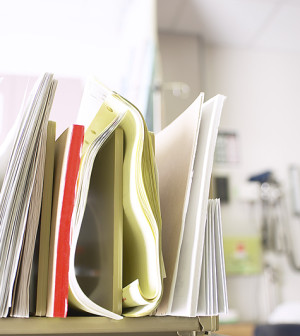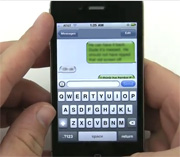- Double Mastectomy May Offer No Survival Benefit to Women With Breast Cancer
- Toxic Lead Found in Cinnamon Product, FDA Says
- Certain Abbott Blood Sugar Monitors May Give Incorrect Readings
- Athletes Can Expect High Ozone, Pollen Counts for Paris Olympics
- Fake Oxycontin Pills Widespread and Potentially Deadly: Report
- Shingles Vaccine Could Lower Dementia Risk
- Your Odds for Accidental Gun Death Rise Greatly in Certain States
- Kids From Poorer Families Less Likely to Survive Cancer
- Tough Workouts Won’t Trigger Cardiac Arrest in Folks With Long QT Syndrome
- At-Home Colon Cancer Test Can Save Lives
Text Message From Your Heart Doc: ‘Take Your Medicine’


In the future, better care for heart patients may be just a text message away.
So says a new study that found patients recovering from heart attack took more of their medicines on time when they received regular text messages reminding them to do so.
People who received the text reminders were 16 percent to 17 percent better at taking anti-clotting medicines at the right time and in the correct dosage, according to a study to be presented Sunday at the annual meeting of the American Heart Association in Dallas.
“These medications are critical because patients can have serious life-threatening complications if they don’t take them,” explained study lead author Linda Park, a post-doctoral fellow at the San Francisco VA Medical Center.
The study followed 90 heart patients, averaging 59 years of age, for 30 days. All of the patients had either had a heart attack, had an artery-opening stent placed into a clogged vessel, or both. One third of the patients received two medication reminder texts every day, as well as a text containing a more general heart-health tip three times a week. Another third only received the heart-health tip texts, and the last group (the “control” group) received no texts at all.
Park said a medication reminder message might read: “John, take [blood thinner] Plavix at 9 a.m. Respond with 1.” Patients then had to respond to let doctors know they received the reminder.
A heart-health tip might involve trimming the fat off of meat or exercising at least 150 minutes a week, Park said.
The researchers tracked the patients’ medication use via pill bottles that kept a digital record of whenever they had been opened, she said. They also asked patients to report when they had taken medications and what dosage they had taken.
Patients who received either type of text message tended to keep up with their medication schedule better than those who received no communication, the researchers found.
For example, the group who received reminders and tips had an 88 percent rate of correct doses taken, compared with a 72 percent rate for people who received no texts. The group that received only heart-health tips had a 95 percent rate of number of doses taken, compared with 79 percent for those who received no texts.
“Just having contact with these patients over the month, they did better than the control group,” Park said.
She said the technology is already in place for any health care organization to provide reminder texts to patients. Her team used an automated web-based system that allowed them to enter each patients’ contact information, set reminders to go out at specific times, and customize the content of each text to the specific patient.
“It was a really easy system to use, and could be of particular help targeting high-risk populations who have frequent readmissions and may suffer life-threatening complications if they don’t take their medications,” she said.
Researchers will continue to tweak the messaging system to see what will work best for patients. “We’re still trying to figure out the frequency and duration and content we need to deliver for these patients,” Park said. “It might just take three times a week, or once a week if you’re going to do this life-long.”
But at this time it seems as though text messaging could be an effective way to help patients help themselves by taking their medications as directed.
“Medication adherence is a really big problem that we haven’t been able to solve,” Park said. “I think incorporating technology is the wave of the future for everything, including medicine. This method has good potential. It’s not going to solve all of our problems, obviously, but it’s a very promising start.”
Experts note that findings presented at medical meetings are typically considered preliminary until published in a peer-reviewed journal.
More information
For more information on heart medications, visit the American Heart Association.
Source: HealthDay
Copyright © 2024 HealthDay. All rights reserved.










